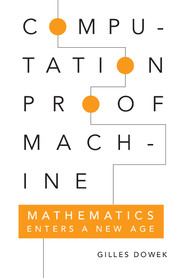Book contents
- Frontmatter
- Dedication
- Contents
- Introduction: In Which Mathematics Sets Out to Conquer New Territories
- PART ONE Ancient Origins
- PART TWO The Age of Reason
- 3 Predicate Logic
- 4 From the Decision Problem to Church's Theorem
- 5 Church's Thesis
- 6 Lambda Calculus, or an Attempt to Reinstate Computation in the Realm of Mathematics
- 7 Constructivity
- 8 Constructive Proofs and Algorithms
- Part Three Crisis of the Axiomatic Method
- Conclusion: As We Near the End of This Mathematical Voyage …
- Biographical Landmarks
- Bibliography
- References
3 - Predicate Logic
from PART TWO - The Age of Reason
Published online by Cambridge University Press: 05 May 2015
- Frontmatter
- Dedication
- Contents
- Introduction: In Which Mathematics Sets Out to Conquer New Territories
- PART ONE Ancient Origins
- PART TWO The Age of Reason
- 3 Predicate Logic
- 4 From the Decision Problem to Church's Theorem
- 5 Church's Thesis
- 6 Lambda Calculus, or an Attempt to Reinstate Computation in the Realm of Mathematics
- 7 Constructivity
- 8 Constructive Proofs and Algorithms
- Part Three Crisis of the Axiomatic Method
- Conclusion: As We Near the End of This Mathematical Voyage …
- Biographical Landmarks
- Bibliography
- References
Summary
in the previous chapters, we focused on a few key events illustrating the enduring problem of computation throughout the history of mathematical practice. We could have explored this issue at greater length: we could have mentioned Pascal's triangle, Gauss– Jordan elimination, and so forth. We choose, however, to leave this arduous task to historians and proceed to the heart of this book: the metamorphoses of computation in the twentieth century.
In the twentieth century, the notion of computation developed in tandem with that of reasoning, so we will approach the metamorphoses of computation by way of a brief detour through the history of reasoning. So far, we have traced this history up to the point at which the Stoics and Aristotle developed their separate logics – neither of which turned out to be rich enough to express mathematical propositions. In the centuries that followed, little progress was made on conceiving a grammar fit for mathematical reasoning – despite some valiant attempts, for example, by Leibniz – until the late nineteenth century, when Gottlob Frege turned his hand to it. Ironically, Frege's motives in taking on this challenge were philosophical rather than mathematical: his aim was to shed light on a specific point of Emmanuel Kant's philosophy the better to refute it.
SYNTHETIC A PRIORI JUDGMENTS
The propositions “triangles have three angles” and “the earth has a satellite” are both true, but for different reasons. The fact that triangles have three angles is inherent in the definition of the word “triangle,” whereas nothing in the definition of the word “earth” implies that the earth has a satellite. In other words, one cannot imagine a triangle having four or five angles, but it is quite possible to imagine the earth having no satellite – after all, Mercury and Venus have none. Kant calls “analytic” the judgment according to which a proposition is necessarily – that is, by definition – true; he calls “synthetic” the judgment according to which a proposition is true, but not by definition.
- Type
- Chapter
- Information
- Computation, Proof, MachineMathematics Enters a New Age, pp. 31 - 43Publisher: Cambridge University PressPrint publication year: 2015



